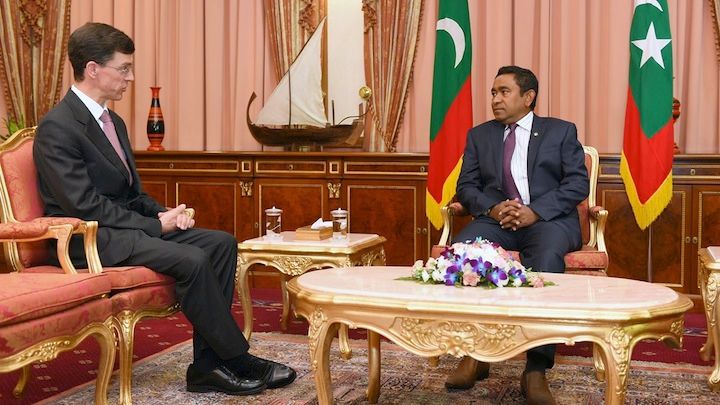The Golden Years, A Golden Celebration – by James Dauris
“A relationship founded on an agreement of protected independence in the past has developed into a relationship today that is wide-ranging and contemporary,” writes James Dauris, the British High Commissioner to the Maldives.

26 Jul 2015, 09:00
In 1965, Britain recognised a group of 1,190 islands in the Indian Ocean – once a British Protectorate – as a completely sovereign and independent state. The Maldives became independent on 26 July 1965; in September that year, it became a member of the UN and in 1982, it joined the Commonwealth family of nations.
Throughout its recorded history, the Maldives had remained largely independent, except for a brief spell of Portuguese occupation in the mid-16th century. As a British Protectorate from 1887 to 1965, it retained full responsibility for its domestic affairs. Since 1965, the country has witnessed many changes: in governance and leaders; in economic development and the growth of its today flourishing tourist industry; in its relationship to the rest of the international community.
The Maldives’ relationship with the UK has been one of respect and mutual co-operation. After the Second World War Britain was given permission by the Maldivian government to re-establish its wartime airfield on Gan Island in the southernmost atoll of the country, Addu. In 1956 the Royal Air Force began developing the base, employing hundreds of Maldivians. The British were informally granted a 100-year lease of Gan that required them to pay £2000 a year; this agreement was later revised in favour of the Maldives until Britain ceased to use Gan in 1976. Her Majesty Queen Elizabeth II visited Male’ and Gan in March 1972 – a special visit that lives on in the memories of many Maldivians.
A relationship founded on an agreement of protected independence in the past has developed into a relationship today that is wide-ranging and contemporary. Our two countries’ bilateral relationship encompasses several areas. One of the most important of these is education. There are hundreds of Maldivian students studying in the UK at different levels at any given time. Every year, approximately a hundred student visas are issued to Maldivians. With this in mind, we operate a temporary UK visa application centre in Male’ every August, to make the process more convenient for Maldivian students. This will be happening again next month, on Wednesday, 26 August, for the third consecutive year.
Become a member
Get full access to our archive and personalise your experience.
Already a member?
Discussion
No comments yet. Be the first to share your thoughts!
No comments yet. Be the first to join the conversation!
Join the Conversation
Sign in to share your thoughts under an alias and take part in the discussion. Independent journalism thrives on open, respectful debate — your voice matters.




